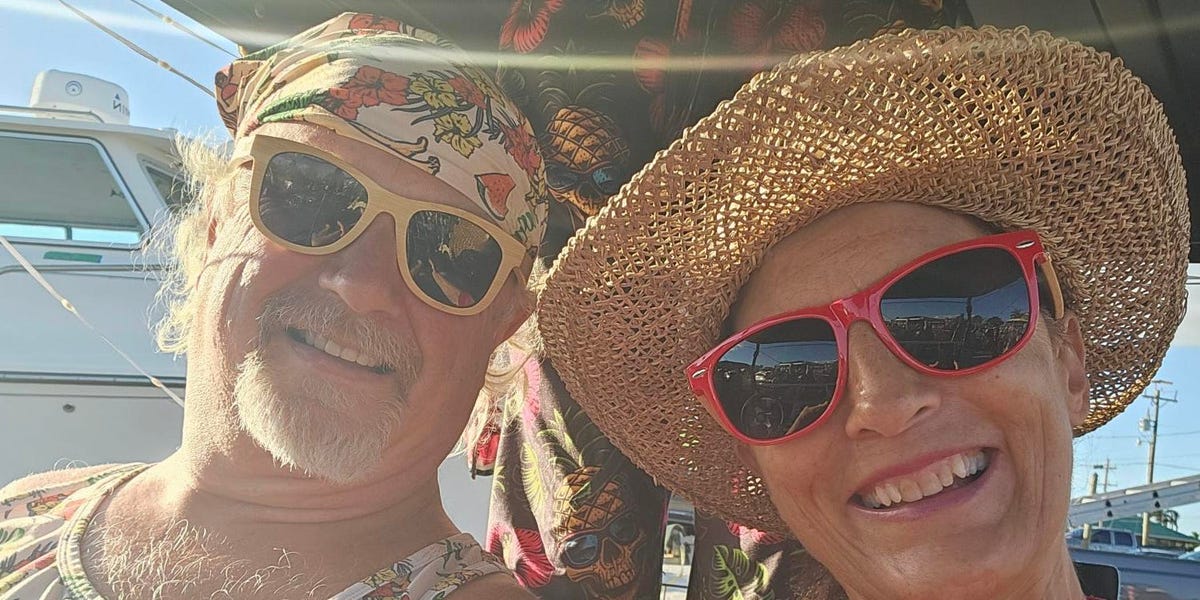- A boomer and her husband moved to southwest Florida from Minnesota to start her clothing business.
- Despite losing almost everything in Hurricane Ian, she decided to stay and rebuild in Florida.
- She said it’s taken a lot of effort, but her business is growing and life is more peaceful.
Thanks for signing up!
Access your favorite topics in a personalized feed while you’re on the go.
download the app

Barbara Pelton, 60, had her eyes set on Florida as an idyllic place to start her clothing business and live in warmer weather after spending most of her life in Minnesota. Little did she know that within the first two years, she would lose nearly everything in 2022’s Hurricane Ian.
The southwest Florida resident paused her business as she figured out where to stay, how to salvage what was left, and where to go next. She decided to stay in her community and help others, and once she and her husband bought the home they previously rented, they started renovations and continued to grow their company. She anticipates Florida is where she’ll stay for the time being.
According to the Census Bureau’s most recent tabulation of American Community Survey data, nearly 739,000 people moved to Florida between 2021 and 2022, compared to nearly 490,000 who moved out. About 9,200 former Minnesotans moved to the Sunshine State during this period.
Many movers to Florida told BI they decided to relocate due to the lack of a state income tax, ample retirement opportunities, and a laid-back lifestyle. Others have cited the state’s robust economy and entrepreneurial opportunities.
Leaving Minnesota
Pelton was born and raised in Minnesota, surrounded by hiking trails, fishing spots, and camping grounds.
She bought a house in rural Minnesota with her husband, who she’s been married to for 37 years, had kids, and worked as a mental health practitioner.
“I had been pretty much in my hometown up until my 40s, so we ended up moving out of the neighborhood house, and my husband and I moved into the suburbs,” Pelton said.
They moved to southern Minnesota, then northern Minnesota to an off-the-grid cabin an hour north of Duluth. She said she felt like her childhood was returning to her.
“We pretty much homesteaded the land. We had well water, chickens, a garden, putting our own wood for heat in the winter,” Pelton said.
Around the start of the pandemic, she shifted from working in the mental health space and began planning an eco-friendly, sustainable clothing brand with her husband, who helped produce videos for the website.
They knew northern Minnesota was not conducive to starting a business, so they considered Florida an ideal location.
“It’s great for the weather, and most people do move to the Sunshine State for that reason, but for us, we were looking at it from the business angle, sort of like where can we really launch this thing, where is it going to be accepted,” Pelton said.
They settled in southwest Florida after selling nearly everything they owned and putting their Minnesota home on the market. They drove their small car from Minnesota, bringing their essentials, dogs, video editing equipment for her husband’s job, and important heirlooms.
Navigating Hurricane Ian
They rented a small home in southwest Florida as they got their business started and figured out where they wanted to settle permanently in Florida. Shortly after moving, their insurance agent told them they wouldn’t be insured as they were in a floodplain, and the couple moved their belongings to a rental facility shortly before hurricane season.
As news of Hurricane Ian spread, they returned to Minnesota to escape any storms and spend time with family. She didn’t think much of it, as she had been through snowstorms and didn’t expect major damage.
However, her community took a direct hit. She said there was water up to the windows of her home, and some of her belongings were washed away. She said it was “like a bomb went off,” noting that they had to completely start over a month later.
“Imagine life is normal, we’re launching our new business, and all of a sudden, the next day, you own almost nothing,” Pelton said. “Thankfully, we had our vehicles, but other than that, pretty much all those things we did bring from the big move from Minnesota were gone. We’re talking checkbooks, clothing, it was unreal.”
They didn’t know what they would come back to after the hurricane, and Pelton said it was worse than she anticipated. She had to take a boat to her property, and she said trees everywhere had fallen, telephone wires were all over the place, roofs had flown off, and garbage littered the streets. There was a foot of her belongings everywhere, from clothing to kitchen utensils to her neighbors’ belongings.
“We’re talking random stuff like grills in the middle of the road, or tons of cars that and boats and trailers in the ditch,” Pelton said, adding her first visit back was eerily silent.
They got a few belongings that survived the storm, and their neighbors checked in on the property to ensure mold didn’t grow inside. It took a few weeks for the road to be repaired, and it wasn’t until a month later that debris was removed from the streets and homes.
Pelton stayed with her husband at her sister-in-law’s place nearby, and she said they came down to the community every three days to help in the recovery process. There was no power or water, and she felt her childhood survival skills coming back into play.
“I had already said goodbye to some of those sentimental things per se, but I felt a really heavy heart for some of those people here who weren’t able to do that,” Pelton said.
A connection from Minnesota who lives nearby in Florida heard about their story and offered to let them stay at the house for as long as needed. Their Minnesota home still hadn’t sold, so they stayed at the home for two months and used an Airbnb voucher for hurricane survivors. She also received $700 from FEMA for initial needs. In between volunteering, she said she kept up with yoga.
Ultimately, the landlord allowed them to purchase their rental home that was damaged in the storm, and within a few months, they started to repair it and get their business back up and running. She donated much of her business merchandise to assist those who lost more belongings.
Minnesota vs. Florida: Pros and cons
Pelton estimated that living costs are cheaper in Florida, although she said wages tend to be lower. She said utilities are about the same, as she uses more AC but less heat in Florida. Gas prices are slightly higher in Florida at $3.31 a gallon, compared to $3.17 in Minnesota.
“I think it’s just a personal preference: Do you want to deal with the cold for a few months, or do you want to deal with the extreme heat for a few months?” she said.
She said housing prices are still elevated in Florida, though she’s not seeing many homes in her area selling as the housing market recovers from Hurricane Ian.
Moving to Florida was “by far a better choice” for her to launch the business, as the clientele is more “eclectic” and interested in sustainable clothing, Pelton said. She said there’s a higher demand for athleisure wear in Florida, and the business has grown much faster than she believes it would have in Minnesota.
Pelton said it took time to get used to seasonal economic differences in Florida, where the economy booms between Memorial Day and Labor Day and businesses shutter in the winter. She said in Minnesota, the slower months are often during the summer.
She said in Florida, it’s much easier to eat healthy with readily available fruit and vegetables.
Still, she said the weather overall is more pleasant, especially for outdoor chores such as gardening. She misses Minnesota’s lakes, as many in Florida are not suitable for swimming due to the presence of snakes and alligators. She said she’s also adjusting to the fishing scene in Florida, which is mainly saltwater, compared to freshwater fishing in Minnesota.
Despite all she’s been through, Pelton thinks she’ll stay in Florida for the time being — the only other place she’s considering is India.
“I think in the back of my mind, I’m going to do what a woman had suggested of a lifetime where you move across towns, move across states, move across countries,” Pelton said.
Have you recently moved to a new state or moved out of the US to a different country? Reach out to this reporter at nsheidlower@businessinsider.com.


